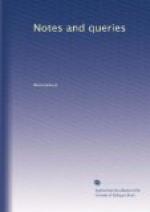Ph. Fletcher’s Purple Island, p. 112. ed. 1633.
On l. 635. (G.):—
“His clouted shoon were nailed for fear of wasting.”
Ph. Fletcher’s Purple Island, p. 113.
On l. 707. (G.) A passage in the Spanish Tragedy confirms Mr. Warton’s reasoning—
“After them doth Hymen hie as fast,
Clothed in sable and a saffron
robe.”
Old Plays, vol. iii. p. 214. ed. 1780.
On l. 734. (G.):—
“Saw you not a lady come this way
on a sable horse
studded with stars of white?”
Beaumont and Fletcher’s Philaster, Act iv.
On l. 752. (G.):—
“A sweet vermilian tincture
stained
The bride’s fair cheek.”
Quarles’ Argalus and Parthenia, p. 118. ed. 1647.
On l. 812. (G.):—
“Bathed in worldly bliss.”
Drayton, p. 586. ed. 1753.
“The fortunate who bathe in floods of joys.”
E. of Sterline’s Works, p. 251. ed. 1637.
On l. 834. (D.):—
“The lily-wristed morn.”
The Country Life, Herrick’s Hesperides, p. 269.
(G.):—
“Reacht him her ivory hand.”
Ph. Fletcher’s Purple Island, p. 117.
On l. 853. (G.) Compare this line of Drayton in his Baron’s Warrs:—
“Of gloomy magicks and benumbing charms.”
Vol. i. p. 110. ed. 1753.
On l. 861. (G.):—
“Through whose translucent sides much light is born.”
Ph. Fletcher’s Pur. Island, C. 5. St. 31. p. 54.
On l. 862. (M.):—
“All hundred nymphs, that in his
rivers dwell,
About him flock, with water-lilies crowned.”
Ph. Fletcher’s Poet. Miscell., p 67. ed. 1633.
On l. 863. (G.) The use of Ambergris, mentioned in Warton’s note, appears from Drayton, v. ii. p. 483.:—
“Eat capons cooked at fifteen crowns
apiece,
With their fat bellies stuft with ambergrise.”
On l. 886. (G.):—
“The wealth of Tarsus nor the rocks
of pearl,
That pave the court of Neptune,
can weigh down
That virtue.”
Beaumont and Fletcher’s Philaster, Act iv.
On l. 894. (G.):—
“Beset at th’ end with emeralds and turches.”
Lingua iv. 4. Old Plays, v. 5. p. 202. ed. 1780.
On l. 924. (M.) Mr. Warton says this votive address was suggested by that of Amoret in the Faithful Shepherdess; but observes that “the form and subject, rather than the imagery, is copied.” In the following maledictory address from Ph. Fletcher’s 2nd eclogue, st. 23., the imagery is precisely similar to Milton’s, the good and evil being made to consist in the fulness or decrease of the water, the clearness or muddiness of the stream, and the nature of the plants flowing on its banks:—




